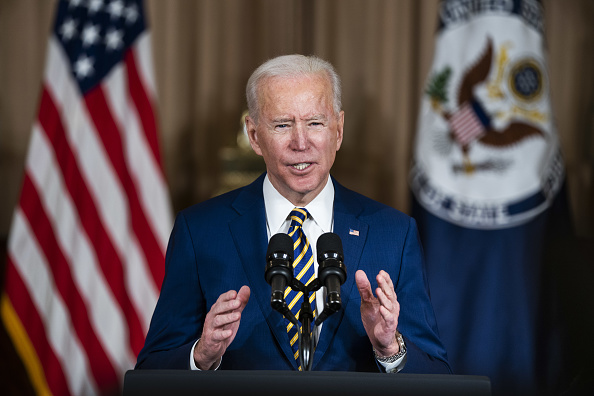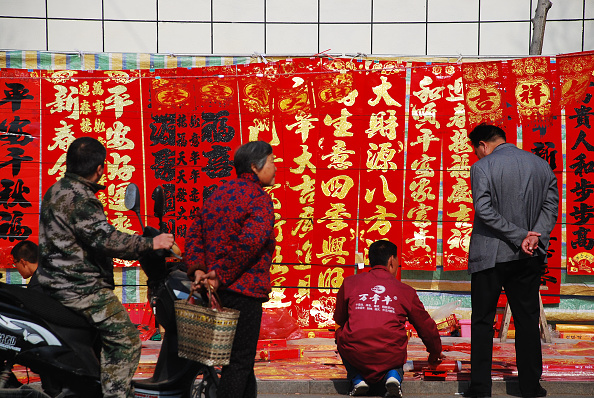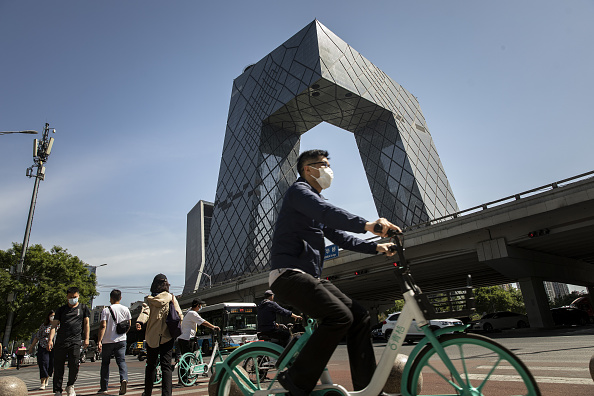
 "The Most Serious Competitor"
"The Most Serious Competitor"
President Joe Biden is beginning to lay out his administration's stance on China, as he called China the "most serious competitor" to the United States in his first Presidential State Department address on Thursday. In a lengthy speech, he promised to "confront China's economic abuses, counter its aggressive, coercive actions, and push back on China's attacks on human rights, intellectual property and global governance," while reinstating the power of the State Department, which was diminished under the Trump administration.
The overall speech by President Biden, which outlined his broader foreign policy vision for the U.S., was a marked departure from the former administration's handling of foreign relations. Under Trump's America First policy, key U.S. alliances were downplayed, and international commitments were either put on the back burner or cancelled altogether. "When we strengthen our alliances we amplify our power as well as our ability to disrupt threats before they reach our shores," Biden said.
The new administration also announced it plans to reassess America's critical supply chains in hopes of reducing dependency on other countries, but experts say the move is largely aimed at China, which is currently one of America's top suppliers for medical supplies. For more on the challenges facing the Biden administration, read Biden's Challenge to Restore Sino-America Relations from Richard Javad Heydarian.
 Quiet Celebrations
Quiet CelebrationsAs China begins its month-long Lunar New Year celebration, new data shows that China's recent coronavirus restrictions have started to slow its economy, which had been on an upward trajectory in recent months. Transportation and factory production saw marked declines relative to earlier months. The decrease is likely to persist through the end of the month, but the economy will likely "normalize quickly as effective control measures limit the prolonged impact," says Hunter Chan, an economist at Standard Chartered Bank.
As the country gears up for its holiday festivities, which will likely be more muted this year due to the decrease in travel expected, China is rolling out its vaccine across the country. So far, as of earlier this week about 24 million doses have been administered. China's stated goal is to administer doses to 50 million people — or about 3.5% of the total population — before Lunar New Year.
Meanwhile, China has also called for other countries to allow the World Health Organization (WHO) to investigate the origins of the coronavirus. Chinese Foreign Ministry spokesman Wang Wenbin said that China hopes that "relevant parties...adopt a positive attitude in tracing the origins and invite WHO experts to conduct origins studies, contributing to their efforts on the global fight against the pandemic." Earlier this week, a 13-person delegation of WHO scientists visited the Wuhan market where the coronavirus was first reported, as well as the Wuhan medical laboratory that has been the center of coronavirus-related conspiracies.
 Off the Air
Off the AirThe United Kingdom announced it would revoke Chinese TV network CGTN's broadcasting license, adding to a mounting list of hostilities between China and Great Britain. An investigation into the station's ownership by UK regulators cited lack of editorial control by the owner of the broadcast license, Star China Media Limited, and also concerns about the network's links to China's ruling Communist Party.
Last week, the UK began welcoming five million British National Overseas (BNO) passport holders from Hong Kong into the country. Britain's move, prompted by China's national security law announced in 2020, has drawn criticism from Beijing. Under the new rule, Hong Kong citizens born before the territory was handed back to China in 1997 can move with their families to the U.K. on five-year visas, with the ability to apply for citizenship after the visa expires. In response to the move, China will no longer accept the BNO passport as a valid travel document in China.
The mounting tensions between London and Beijing come as China experiences difficulties with other nations as well. Within the Five Eyes Alliance, a security and intelligence alliance comprising Canada, the United States, the United Kingdom, Australia, and New Zealand, China has faced lengthy disputes with almost all of the group's members.
Prepared by China-US Focus editorial teams in Hong Kong and New York, this weekly newsletter offers you snap shots of latest trends and developments emerging from China every week, while adding a dose of historical perspective.
- 2021-01-29 Looking Towards Multilateralism
- 2021-01-22 Biden’s China Path
- 2021-01-16 Becoming a "Technological Superpower"
- 2021-01-08 Capital Chaos
- 2020-12-18 All Eyes on 2021
- 2020-12-12 Midwest to Middle Kingdom?
- 2020-12-04 Shifting Winds
- 2020-11-21 Multilateralism on the Move
- 2020-11-14 Staying Tough
- 2020-11-07 Battleground Ballots
- 2020-10-30 Knock Knock
- 2020-10-24 Looking Back and Moving Forward
- 2020-10-16 COVID Cluster
- 2020-10-10 Election Looming
- 2020-10-03 Golden Week Kicks Off
- 2020-09-26 Virtual Diplomacy
- 2020-09-18 Digital Domain
- 2020-09-12 Reframing the Ground Rules
